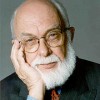Want to know what books James Randi recommends on their reading list? We've researched interviews, social media posts, podcasts, and articles to build a comprehensive list of James Randi's favorite book recommendations of all time.
1

Sir Arthur Conan Doyle | 3.70
The Cottingley Fairies appear in a series of five photographs taken by Elsie Wright and Frances Griffiths, two young cousins who lived in Cottingley, near Bradford in England. In 1917, when the first two photographs were taken, Elsie was 16 years old and Frances was 9. The pictures came to the attention of writer Sir Arthur Conan Doyle, who used them to illustrate an article on fairies he had been commissioned to write for the Christmas 1920 edition of The Strand Magazine. Conan Doyle, as a spiritualist, was enthusiastic about the photographs, and interpreted them as clear and visible... more The Cottingley Fairies appear in a series of five photographs taken by Elsie Wright and Frances Griffiths, two young cousins who lived in Cottingley, near Bradford in England. In 1917, when the first two photographs were taken, Elsie was 16 years old and Frances was 9. The pictures came to the attention of writer Sir Arthur Conan Doyle, who used them to illustrate an article on fairies he had been commissioned to write for the Christmas 1920 edition of The Strand Magazine. Conan Doyle, as a spiritualist, was enthusiastic about the photographs, and interpreted them as clear and visible evidence of psychic phenomena. Public reaction was mixed; some accepted the images as genuine, but others believed they had been faked. Doyle championed the photographs, and in the process destroyed his reputation; which is probably why this book, out of all of the Doyle corpus, has rarely been put into print until now. The Coming of the Fairies was possibly a bigger disappointment for Doyle fans than when he killed off Sherlock Holmes. Interest in the Cottingley Fairies gradually declined after 1921. Both girls married and lived abroad for a time after they grew up, yet the photographs continued to hold the public imagination; in 1966 a reporter from the Daily Express newspaper traced Elsie, who had by then returned to the UK. Elsie left open the possibility that she believed she had photographed her thoughts, and the media once again became interested in the story. In the early 1980s Elsie and Frances admitted that the photographs were faked, using cardboard cutouts of fairies copied from a popular children's book of the time, but Frances maintained that the fifth and final photograph was genuine. The photographs and two of the cameras used are on display in the National Media Museum in Bradford. less 
James RandiWritten in 1922 by the creator of the super-logical character Sherlock Holmes, this to me is a perfect example of very bad thinking. Conan Doyle lost his son Kingsley after Kingsley returned, badly injured, from World War I. And Conan Doyle spent the rest of his life looking for some form of communication from him. He thought that he had found it through several spirit mediums, who fooled him. He... (Source)
See more recommendations for this book...
2

The second volume in the autobiography of this prolific science fiction writer, who was also a child prodigy and a renowned professor. This recounts his career from his first book to his 200th, from early rejections to critical acclaim. Photographs, a catalog of his books by Asimov, title and name indexes. more The second volume in the autobiography of this prolific science fiction writer, who was also a child prodigy and a renowned professor. This recounts his career from his first book to his 200th, from early rejections to critical acclaim. Photographs, a catalog of his books by Asimov, title and name indexes. less 
James RandiAs I sit here in my office I look up at a photograph of Isaac on the wall, and in the room next door there is Isaac Asimov’s library, about 4,000 books on science and pseudoscience. He was a very good friend and dearly missed. In Joy Still Felt is a joyous book, as its title suggests, and Isaac was a joyous person. (Source)
See more recommendations for this book...
3

Virtually unknown today, Alfred Russel Wallace was the co-discoverer of natural selection with Charles Darwin and an eminent scientist who stood out among his Victorian peers as a man of formidable mind and equally outsized personality. Now Michael Shermer rescues Wallace from the shadow of Darwin in this landmark biography.
Here we see Wallace as perhaps the greatest naturalist of his age--spending years in remote jungles, collecting astounding quantities of specimens, writing thoughtfully and with bemused detachment at his reception in places where no white man had ever gone. Here,... more Virtually unknown today, Alfred Russel Wallace was the co-discoverer of natural selection with Charles Darwin and an eminent scientist who stood out among his Victorian peers as a man of formidable mind and equally outsized personality. Now Michael Shermer rescues Wallace from the shadow of Darwin in this landmark biography.
Here we see Wallace as perhaps the greatest naturalist of his age--spending years in remote jungles, collecting astounding quantities of specimens, writing thoughtfully and with bemused detachment at his reception in places where no white man had ever gone. Here, too, is his supple and forceful intelligence at work, grappling with such arcane problems as the bright coloration of caterpillars, or shaping his 1858 paper on natural selection that prompted Darwin to publish (with Wallace) the first paper outlining the theory of evolution. Shermer also shows that Wallace's self-trained intellect, while powerful, also embraced surprisingly naive ideas, such as his deep interest in the study of spiritual manifestations and seances. Shermer shows that the same iconoclastic outlook that led him to overturn scientific orthodoxy as he worked in relative isolation also led him to embrace irrational beliefs, and thus tarnish his reputation.
As author of Why People Believe Weird Things and founding publisher of Skeptic magazine, Shermer is an authority on why people embrace the irrational. Now he turns his keen judgment and incisive analysis to Wallace's life and his contradictory beliefs, restoring a leading figure in the rise of modern science to his rightful place.
less 
James RandiI was particularly fascinated by this book of Michael Shermer’s because Alfred Russel Wallace is a name that most students are not familiar with. But if you have a good knowledge of science you will recognise the name right away. He and Darwin converged on the idea of evolution from different angles. But Darwin was well supported by his family’s wealth and the fact that he could travel across the... (Source)
See more recommendations for this book...
4

***30th Anniversary Edition***
Cover note: Each copy of the anniversary edition of The Blind Watchmaker features a unique biomorph. No two covers are exactly alike.
Acclaimed as the most influential work on evolution written in the last hundred years, The Blind Watchmaker offers an inspiring and accessible introduction to one of the most important scientific discoveries of all time. A brilliant and controversial book which demonstrates that evolution by natural selection - the unconscious, automatic, blind yet essentially... more ***30th Anniversary Edition***
Cover note: Each copy of the anniversary edition of The Blind Watchmaker features a unique biomorph. No two covers are exactly alike.
Acclaimed as the most influential work on evolution written in the last hundred years, The Blind Watchmaker offers an inspiring and accessible introduction to one of the most important scientific discoveries of all time. A brilliant and controversial book which demonstrates that evolution by natural selection - the unconscious, automatic, blind yet essentially non-random process discovered by Darwin - is the only answer to the biggest question of all: why do we exist? less 
James RandiThey talk about the blind watchmaker not being able to make a watch, but if you’re given an almost infinite number of combinations and permutations of materials and situations, the world will come about. Or it may not. In our case, it came about. You’re here, I’m here, and I’m very happy about that. (Source)

Jerry CoyneIf I had to pick just one self-contained book that lays out Dawkins’s philosophy and methodology, and shows his literary skills, I would have to pick this one. (Source)

Tom ClarkeDawkins brought Darwin up to date, explaining evolution in a way that incorporates our understanding of genetics and heredity. (Source)
See more recommendations for this book...
5

How can we make intelligent decisions about our increasingly technology-driven lives if we don’t understand the difference between the myths of pseudoscience and the testable hypotheses of science? Pulitzer Prize-winning author and distinguished astronomer Carl Sagan argues that scientific thinking is critical not only to the pursuit of truth but to the very well-being of our democratic institutions.
Casting a wide net through history and culture, Sagan examines and authoritatively debunks such celebrated fallacies of the past as witchcraft, faith healing, demons, and UFOs. And... more How can we make intelligent decisions about our increasingly technology-driven lives if we don’t understand the difference between the myths of pseudoscience and the testable hypotheses of science? Pulitzer Prize-winning author and distinguished astronomer Carl Sagan argues that scientific thinking is critical not only to the pursuit of truth but to the very well-being of our democratic institutions.
Casting a wide net through history and culture, Sagan examines and authoritatively debunks such celebrated fallacies of the past as witchcraft, faith healing, demons, and UFOs. And yet, disturbingly, in today’s so-called information age, pseudoscience is burgeoning with stories of alien abduction, channeling past lives, and communal hallucinations commanding growing attention and respect. As Sagan demonstrates with lucid eloquence, the siren song of unreason is not just a cultural wrong turn but a dangerous plunge into darkness that threatens our most basic freedoms. less 
James RandiFirst of all, Carl was my very good friend, and we had a lot of confidences over the years. He was the epitome of the scientific mind and the scientific thinker. In The Demon-Haunted World, one of his later books, he investigates pseudoscience, frauds and fakes, and the mistakes that scientists made over the years. It’s very comprehensive. He had a whole chapter devoted to “Carlos” – or Jose... (Source)

Philip PlaitHe holds your hand and shows you the wonders of science and the universe. The Demon-Haunted World is probably his best book. (Source)

Dallas Campbell@TheChilterns Even if you profoundly disagree with Clarke, it’s very detailed. The classic is of course ‘The Demon Haunted World’ by Carl Sagan. When I’m Prime Minister it will be compulsory reading at school! Best book on what science is/isn’t and why we think the way we do. 👍 (Source)
See more recommendations for this book...
Don't have time to read James Randi's favorite books? Read Shortform summaries.
Shortform summaries help you learn 10x faster by:
- Being comprehensive: you learn the most important points in the book
- Cutting out the fluff: you focus your time on what's important to know
- Interactive exercises: apply the book's ideas to your own life with our educators' guidance.


